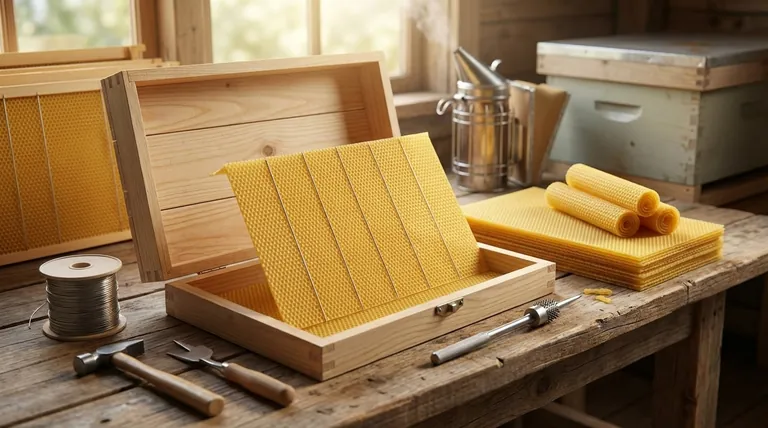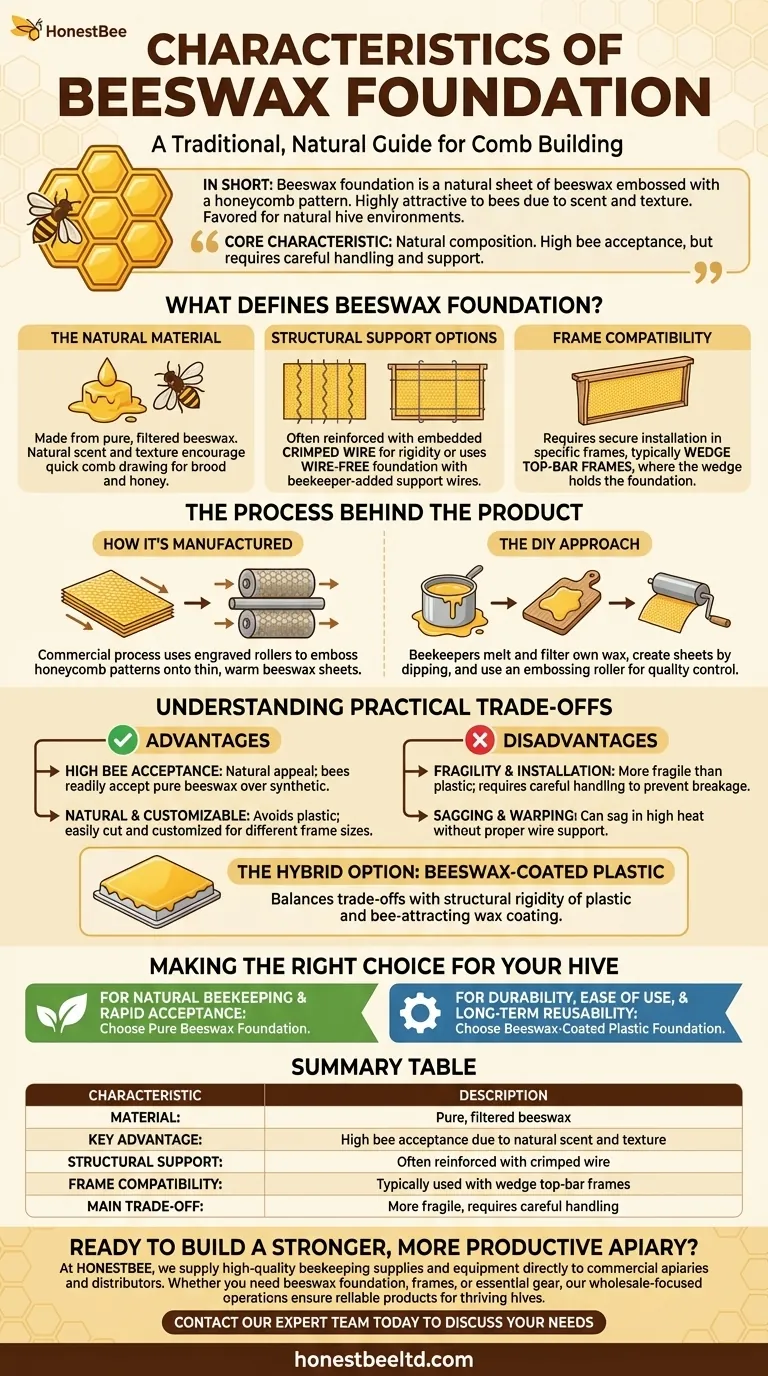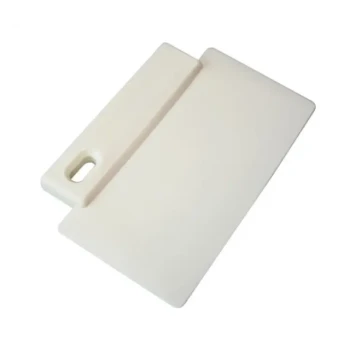In short, beeswax foundation is a traditional, natural sheet of beeswax embossed with a honeycomb pattern, which serves as a guide for bees to build their comb. It is highly attractive to bees due to its natural scent and texture and is often chosen by beekeepers who prioritize a natural hive environment. It can be reinforced with wire for added stability and is typically installed in specific frame types, like wedge frames.
The core characteristic of beeswax foundation is its natural composition. This makes it highly accepted by bees but also requires more careful handling and support compared to rigid, plastic-based alternatives.

What Defines Beeswax Foundation?
The Natural Material
Beeswax foundation is made from pure, filtered beeswax. This material is inherently familiar to honeybees.
The natural scent and texture attract bees, encouraging them to quickly draw out the comb, which is essential for brood rearing and honey storage.
Structural Support Options
To prevent sagging under the weight of honey and the heat of the hive, beeswax foundation often incorporates support.
It can come with crimped wire embedded vertically within the wax for rigidity. Alternatively, beekeepers can use wire-free foundation and add their own support wires to the frame.
Frame Compatibility
This type of foundation is not a rigid, standalone product. It must be properly secured within a wooden frame.
Wedge top-bar frames are commonly recommended, as the wedge can be removed, the foundation inserted, and the wedge nailed back in place to hold it securely.
The Process Behind the Product
How It's Manufactured
Commercial beeswax foundation is created using a machine with two rollers. These rollers are engraved with the hexagonal pattern of a honeycomb cell.
As a thin sheet of warm beeswax passes through the rollers, the honeycomb base pattern is embossed onto both sides, providing a clear guide for the bees.
The DIY Approach
Some beekeepers prefer to make their own foundation to control the quality of the wax.
This process involves melting and filtering their own beeswax, creating thin sheets by dipping boards into vats of molten wax, and then running those sheets through an embossing roller. The necessary equipment is often self-made.
Understanding the Practical Trade-offs
Advantage: High Bee Acceptance
The primary benefit of beeswax foundation is its natural appeal. Bees are far more likely to readily accept and build upon a pure beeswax base than a synthetic one.
Advantage: Natural and Customizable
For beekeepers focused on natural methods, using pure beeswax avoids introducing plastic into the hive. The sheets are also easy to cut and customize for different frame sizes or hive configurations.
Disadvantage: Fragility and Installation
Beeswax foundation is more fragile than plastic alternatives. It requires more careful handling during installation to prevent breakage.
It can also sag or warp in high heat if not properly supported with wires, which adds an extra step to frame assembly.
The Hybrid Option: Beeswax-Coated Plastic
To balance these trade-offs, many beekeepers use beeswax-coated plastic foundation. This provides the structural rigidity and durability of plastic while the wax coating encourages bee acceptance.
Making the Right Choice for Your Hive
Choosing a foundation depends entirely on your beekeeping philosophy and practical goals.
- If your primary focus is natural beekeeping and ensuring rapid acceptance by the colony: Pure beeswax foundation is the ideal choice.
- If your primary focus is durability, ease of use, and long-term reusability: A beeswax-coated plastic foundation offers a reliable and practical compromise.
Ultimately, the best foundation is one that aligns with your management style and supports a healthy, productive hive.
Summary Table:
| Characteristic | Description |
|---|---|
| Material | Pure, filtered beeswax |
| Key Advantage | High bee acceptance due to natural scent and texture |
| Structural Support | Often reinforced with crimped wire to prevent sagging |
| Frame Compatibility | Typically used with wedge top-bar frames |
| Main Trade-off | More fragile than plastic; requires careful handling |
Ready to build a stronger, more productive apiary?
At HONESTBEE, we supply high-quality beekeeping supplies and equipment directly to commercial apiaries and distributors. Whether you're looking for durable beeswax foundation, frames, or other essential gear, our wholesale-focused operations ensure you get the reliable products you need to support healthy, thriving hives.
Contact our expert team today to discuss your specific needs and discover how we can help your operation succeed.
Visual Guide

Related Products
- Beeswax Foundation Sheets Beehive Foundation for Wholesale
- Notebook Style Beeswax Foundation Mould Wax Foundation Mold
- Manual Beeswax Comb Foundation Machine Wax Foundation Mill Embossing Machine
- Colorful Silicone Beeswax Foundation Mold Mould for Beekeeping
- Electric Beeswax Foundation Machine With Operating Tray and Wax Foundation Roller
People Also Ask
- Why is beeswax preferred over plastic for foundations? Align Your Choice with Your Beekeeping Philosophy
- What is a comb foundation sheet and what are its advantages? Boost Hive Efficiency and Honey Yield
- How do embossed wax foundations pre-installed in beehive frames contribute to honey production efficiency? Yield Secrets
- What is the process of 'drawing out foundation' in a beehive? A Guide to Perfecting Your Honeycomb Structures
- What are the advantages of using a comb foundation sheet? Boost Hive Productivity & Honey Yields
- Which tools are required for the professional cross wiring of wax foundation? Essential Gear for Strong Honeycomb
- How is wax foundation used within a beehive? Optimize Your Honey Yield with Expert Guidance
- Why is it necessary to pre-treat wax substrates with anti-wax moth agents? Protecting Your Research Data



















